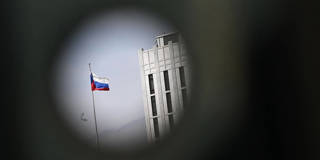For the last 14 months, the world economy has undergone an unprecedented experiment: severing trade, financial, and personal links with a country that spans 11 time zones and sits at the heart of globalization. Can it really work?
ROME/BERLIN – This year, according to the International Monetary Fund’s latest forecast, Russia’s economy will grow faster than that of Germany or the United Kingdom, and will keep pace with growth in France and Italy. Its economy is thus expected to hold its own against, or even outpace, four of the G7 countries that have been leading efforts to maintain and strengthen the crippling international sanctions imposed on Vladimir Putin’s regime more than a year ago, following Russia’s full-scale invasion of Ukraine.
This was not the plan. Last spring, while Putin counted on a quick military victory, Western leaders believed economic and financial weapons could overwhelm Russia. In early April 2022, Mario Draghi, then Italy’s prime minister, channeled this conviction when he defended sanctions on Russian energy exports by saying people had to choose between peace and air conditioning.
Fortunately, confidence in the efficacy of sanctions did not prevent the United States and its allies from sending weapons and other aid to Ukraine. But the initial expectation was that impounding Russia’s foreign exchange reserves held abroad, harsh restrictions on Russian banks and individuals, and cut-offs in trade in technology and raw materials would cause the Russian economy to collapse, potentially forcing Putin to abandon his “special military operation.” Less than two months after the invasion, the IMF was forecasting that Russia’s economy would contract by 8.5% in 2022 and by 2.3% this year.

ROME/BERLIN – This year, according to the International Monetary Fund’s latest forecast, Russia’s economy will grow faster than that of Germany or the United Kingdom, and will keep pace with growth in France and Italy. Its economy is thus expected to hold its own against, or even outpace, four of the G7 countries that have been leading efforts to maintain and strengthen the crippling international sanctions imposed on Vladimir Putin’s regime more than a year ago, following Russia’s full-scale invasion of Ukraine.
This was not the plan. Last spring, while Putin counted on a quick military victory, Western leaders believed economic and financial weapons could overwhelm Russia. In early April 2022, Mario Draghi, then Italy’s prime minister, channeled this conviction when he defended sanctions on Russian energy exports by saying people had to choose between peace and air conditioning.
Fortunately, confidence in the efficacy of sanctions did not prevent the United States and its allies from sending weapons and other aid to Ukraine. But the initial expectation was that impounding Russia’s foreign exchange reserves held abroad, harsh restrictions on Russian banks and individuals, and cut-offs in trade in technology and raw materials would cause the Russian economy to collapse, potentially forcing Putin to abandon his “special military operation.” Less than two months after the invasion, the IMF was forecasting that Russia’s economy would contract by 8.5% in 2022 and by 2.3% this year.